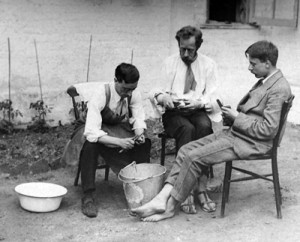
There are memes all over the internet proclaiming that men who do housework “get laid” more often. Google “men who do housework,” and you’ll find, “Porn for Women:” a calendar featuring shirtless men doing household chores. What’s so sexy about men doing housework? The underlying message winks at the fact that, in the US, women continue to do the bulk of household labor even though almost as many of them work for pay outside the home as do men. Even after more than a century of feminist movement, most heterosexual households are still organized along gender lines. Heterogendered tradition still valorizes (and separates) male breadwinners and female caregivers. In this context, men who relieve women of housework are seen as rare, exotic, and even “sexy.”
Of course, real housework isn’t sexy at all. Preparing meals, doing laundry, washing dishes, cleaning – these are tasks that never end. Another common internet meme asks, “Don’t you just love those 12 seconds when all the laundry is done?” We noticed that you could create a lively, acerbic Pinterest page just on gender and housework!
So what does it look like when “real men”—men who consider themselves breadwinners and heads of the household—do housework? Why would these men do housework in the first place? They might do it if they became unemployed. We interviewed 40 men who lost their jobs during the recent recession. Most (85%) of these men expressed traditional viewpoints about gender in the home, saying that men should provide for women and children. And yet, after losing work, most (85%) of these men became financially dependent on their wives or girlfriends. This caused an ideological as well as financial quandary for them. Because their beliefs about masculinity were tangled up with employment, they had to redefine manhood while they were unemployed.
So how did these men prove their manhood? They tackled housework, and they crushed it “like men.” Ben, who called himself, “Mr. Housework,” explained that he mopped, vacuumed, and steam cleaned the floors multiple times a week. Richard said, “I won’t even use a mop on a floor, just on my knees and stuff. I find it somewhat cathartic, believe it or not, but I roll the rugs up, the ones in the kitchen, shaking them outside, leaving them [to air] out.” Our subjects embraced housework to do their part in the family, and they redefined women’s work as hard work—work befitting men. As Brian said, “I would prefer to be working but I just have to step up and be a man in a different kind of manner.”
So it apparently takes a recession to blur the division of labor in traditional household. Will this blurriness last as the economy recovers and men go back to work? Maybe. If “heads of households” and “men’s men” see household labor as real work, this could elevate its worth in larger society, making it less surprising and funny when men and women cross gendered boundaries in their homes.
Kristen Myers is Professor of Sociology and Director of Center for the Study of Women, Gender, & Sexuality at Northern Illinois University. Ilana Demantas is a doctoral candidate in Sociology at University of Kansas. They write about their research in detail in “Being ‘The Man’ Without Having a Job And/Or: Providing Care Instead of ‘Bread’”—a chapter in Families as They Really Are.

Comments